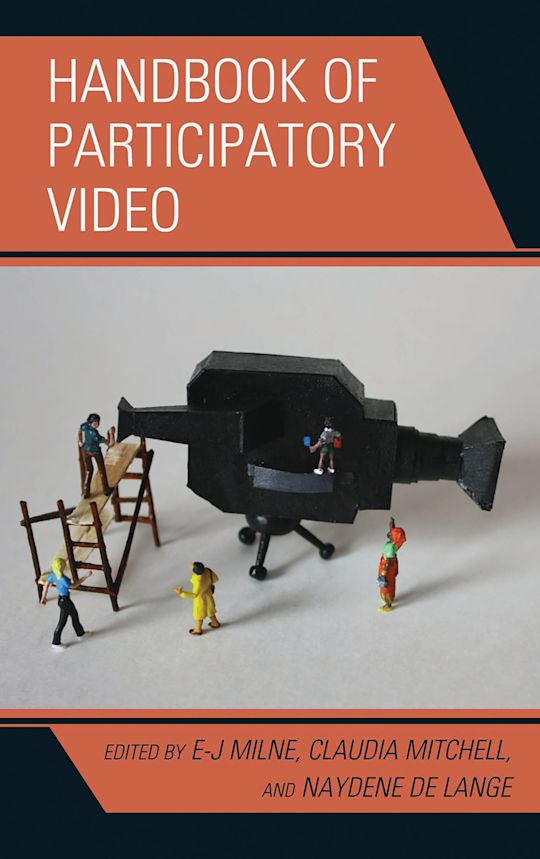Handbook of Participatory Video
Handbook of Participatory Video
This product is usually dispatched within 2-4 weeks
- Delivery and returns info
-
Flat rate of $10.00 for shipping anywhere in Australia
Description
Participatory video is a growing area of research and an increasingly popular tool among practitioners, researchers, and NGOs working with communities around the world. The Handbook of Participatory Video advances the field, engaging critically with it as a research methodology and method and interrogating assumptions about its emancipatory nature and potential for social change. In twenty-eight chapters, contributors examine historical, ethical, methodological, and technical aspects of participatory video and discuss power, ownership, and knowledge production. The Handbook is organized into six parts: Locating Participatory Video, Participatory Video as a Critical Research Methodology, Working with Visual Data, Power and Ethics in Participatory Video, Dissemination and Reaching New Audiences, and Communities and Technologies. This benchmark work takes an interdisciplinary and global approach and will be invaluable to researchers, practitioners, and students.
Table of Contents
Introduction
Part I. Locating Participatory Video
Chapter 1. Citizenship and Participatory Video, by Marit Kathryn Corneil
Chapter 2 . Defining Participatory Video from Practice, by Chris High, Namita Singh, Lisa Petheram, and Gusztáv Nemes
Chapter 3. (Re)framing the Scholarship on Participatory Video: From Celebration to Critical Engagement: From Celebration to Critical Engagement, by Bronwen Low, Chloë Brushwood Rose, Paula M. Salvio, and Lena Palacios
Part II. Participatory Video as a Critical Research Methodology
Chapter 4. Fostering Social Change through Participatory Video: A Conceptual Framework, by Tamara Plush
Chapter 5. Participatory Video Drama: A Feminist Way of Seeing?, by Louise Waite and Catherine P. Conn
Chapter 6. Reflexivity, Participation, and Video, by Kyung-Hwa Yang
Chapter 7. Play, Affect, and Participatory Video as a Reflexive Research Strategy, by Geraldine Bloustien
Chapter 8 . Mixed Methods Research in Participatory Video, by Tilla Olivier, Naydene de Lange, John W. Creswell, and Lesley Wood
Part III. Working with Visual Data
Chapter 9. What Can a Visual Researcher Do with a Storyboard?, by Lukas Labacher, Claudia Mitchell,Naydene de Lange, Relebohile Moletsane, and Marti-Mari Geldenhys
Chapter 10. Youth Video-Making: Selves and Identities in Dialogue, by Wendy Luttrell, Victoria Restler, and Claire Fontaine
Chapter 11. Making Sense of Participatory Video: Approaches for Participatory Content Analysis, by Nitin Sawhney
Chapter 12. Visual Post-production in Participatory Video-making Processes, by Monica Mak
Chapter 13. The Art of Participatory Video: Relational Aesthetics in Artistic Collaborations, by Verena Thomas and Kate Britton
Part IV. Power and Ethics in Participatory Video
Chapter 14. Beyond Empowerment Inspiration: Interrogating the Gap between the Ideals and Practice Reality of Participatory Video, by Jacqueline Shaw
Chapter 15.Challenging Knowledge Production with Participatory Video, by Shannon Walsh
Chapter 16. Saying “No” to Participatory Video: Unraveling the Complexities of (Non)participation, by E-J Milne
Chapter 17. Participatory Video and Situated Ethics: Avoiding Disablism, by Andrea Capstick
Chapter 18. Realizing the Benefits of Ownership through Participatory Video in a Multimedia Age, by Michael LaFlamme, Guy Singleton, and Kado Muir
Part V. Dissemination and Reaching New Audiences
Chapter 19. Using Participatory Video in Monitoring and Evaluation, by Isabelle Lemaire and Chris Lunch
Chapter 20. Building Sustainability into Work with Participatory Video, by Naydene de Lange and Claudia Mitchell
Chapter 21. Dissemination and Ownership of Knowledge, by Elizabeth Miller and Michelle Smith
Chapter 22. Troubling the Politics of Reception in Participatory Video Discourse, by Sara Kindon, Geoff Hume-Cook, and Kirsty Woods
Chapter 23. Using Participatory Video to Engage in Policy Processes: Representation, Power, and Knowledge in Public Screenings, by Joanna Wheeler
Part VI. Communities and Technologies
Chapter 24. Learning from Communities: Personal Reflections from Inside, by Joshua Schwab-Cartas
Chapter 25. Collaborative Mobile Phone Film Making, by Max R.C. Schleser
Chapter 26. Re-visioning Participatory Video: Interactions with Forms of Online Research, by Pamela Teitelbaum
Chapter 27.Copyright in the Participatory and Online Video Environment, by Patricia Aufderheide
Chapter 28. New Directions in Participatory Video: Emerging Digital Technologies and Practices, by Audubon Dougherty and Nitin Sawhney
Index
About the Editors and Contributors
Product details
| Published | 31 Aug 2012 |
|---|---|
| Format | Hardback |
| Edition | 1st |
| Extent | 500 |
| ISBN | 9780759121133 |
| Imprint | AltaMira Press |
| Illustrations | 3 b/w illustrations; 6 b/w photos; 6 tables |
| Dimensions | 236 x 160 mm |
| Publisher | Bloomsbury Publishing |


































